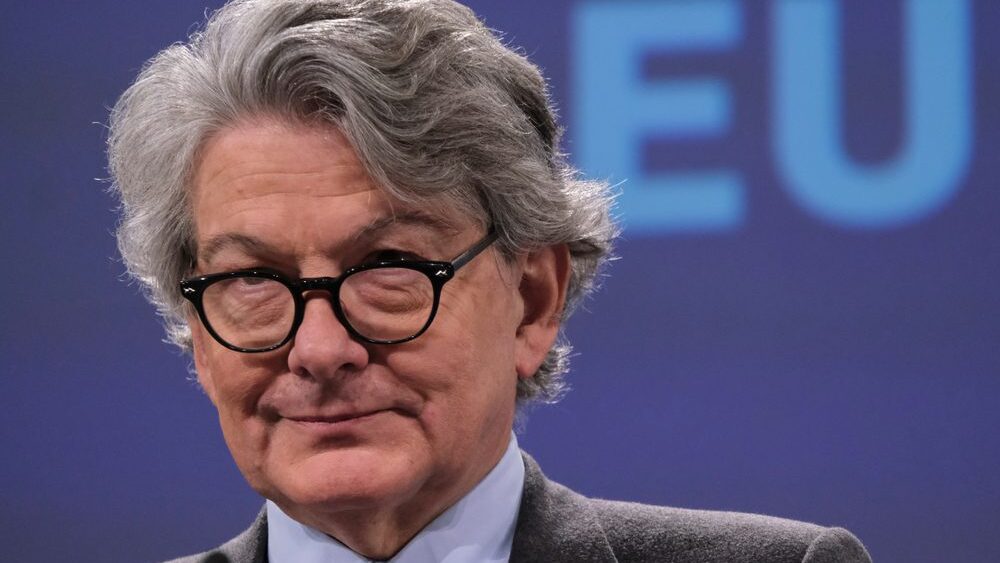
Thierry Breton
Photo: Alexandros Michailidis / Shutterstock.com
The EU’s attempt to regulate AI technology is already coming under fire days after lawmakers agreed on the language for the world’s first regulatory framework for the emergent field following a marathon negotiating session that ended Friday.
Eurocrats were quick to laud a provisional deal on the so-called AI Act, brokered between the European Parliament and Council, that includes limitations on the use of artificial intelligence by law enforcement agencies as well as strict risk categorisation for any new products in the AI family.
Part of an EU attempt to get ahead of the AI era and compensate for the continental lack of innovation, Brussels hopes to set the global tempo on AI development by defining the regulatory boundaries before Silicon Valley or any equivalent outside force does so.
DEAL ON AI! 🦾 After three days of trilogues, negotiators from Parliament & Council have finally reached a political agreement on the Artificial Intelligence Act! 👏 pic.twitter.com/CRKZn0WSSF
— IMCO Committee Press (@EP_SingleMarket) December 8, 2023
First proposed by the European Commission in April 2021, the legislative process for the AI Act has been plagued by one problem after another, with criticism that EU elites are attempting to regulate the unregulatable and risk driving away AI startups from the bloc’s shores entirely.
Parliamentary debates around the AI Act focused heavily on the question of state surveillance, with progressive MEPs adamant about ensuring new technologies would not be used for border security.
The Act is regarded as the political brainchild of French Commissioner and Macron ally Thierry Breton, acknowledged by many Brussels insiders as a likely successor to von der Leyen, who praised the compromise reached on the AI Act as helping to create a ‘launch pad’ for European businesses.
This optimism around the Act was shot down by French President Emmanuel Macron, who issued a warning about the prospective AI law, speaking in Toulouse on Monday, saying that Brussels’ inertia risked giving China and the U.S. an advantage in the AI race.
A repeated criticism of the AI Act is the regulatory risk of suffocating young European tech companies and forcing them to flee to America, with the EU long accused of stifling innovation through its heavy-handed and unresponsive approach to regulation.
Macron specifically cited the example of the French start-up Mistral as an example showing that his country should take the lead in AI. There is strong speculation that Paris will now seek to derail the AI Act in its current form.
Echoing the remarks made by the French President, Visiting Research Fellow at MCC Brussels Dr. Norman Lewis stated to The European Conservative that the announcement was “not anything to celebrate” as he explained that Eurocrats were attempting to regulate themselves out of a commercial hole they had created.
Referring to the Act as almost entirely “self-defeating” for Europe, Dr. Lewis explained how the EU was allowing lawyers to set the pace of change for AI and declared the entire bloc now on the “slow lane” for innovation relative to China and the United States.
“Referees don’t win matches,” Dr. Lewis declared as he summarised Europe’s increasing role in AI development, saying that the bloc was unlikely to impose the AI Act on the world in a similar fashion as was done with GDPR due to the declining power of its common market to dictate terms.
Should it be approved, the AI Act will come into effect circa 2025, with another vote expected in the European Parliament early next year for final parliamentary approval by MEPs, as member states will be given a last-minute opportunity to alter the text decided in Brussels on Friday.
The topic of AI came up during this week’s EU-Chinese Summit, with Beijing offering Europe a partnership in the global governance of AI technology.
